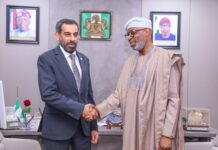A former Minister of State in the Presidency, Republic of Ghana, Dominic Azimbe Azumah, has disclosed how the Economic Community of West African States (ECOWAS) member states and telecommunications regulators can solve the nagging issue of mobile roaming within the sub-region.
In a presentation during the ongoing Delocalised Meeting of the Joint Committee on Telecommunications and Information Technology/Education, Science and Culture/Trade Customs and Free Movement in Niamey, Republic of Niger, Azumah said West African countries have experienced significant economic growth, and regional integration has become a critical aspect of their development.
In the presentation titled ‘ECOWAS Seamless Telecommunications Roaming: Shaping West Africa Future,’ Azumah noted that the telecommunication industry has been at the forefront of the development, and the need for seamless telecommunication roaming has become increasingly important in the region.
According to Azumah, “It is important for the ECOWAS member states to come together to address the challenges militating against seamless telecommunication roaming in the sub-region.
“The EU report in 2016 stated that from the 30th of April, 2016, mobile users would pay the same local tariff when roaming across EU member states. And from 15th June 2017, roaming charges would be totally phased out across EU member states.
“In similar fashion, the ECOWAS member states and telecommunication regulators can come together to develop appropriate measures that support seamless telecommunication roaming in the sub-region. This will help enhance quality of service delivery and encourage full involvement by member states.”
Azumah further said appropriate guidelines that will harmonize roaming activities of the sub-region should be put in place so that people across the ECOWAS member states can enjoy telecommunication service as they travel to other sub-regions.
“Also, since telecommunication tools depend on electricity to function, there should be an expansion of electricity coverage in some ECOWAS countries which have low electricity coverage. This will encourage more people who travel across the ECOWAS countries to enjoy the service provided telecommunication networks,” Azumah also said.
The former Ghanaian Member of Parliament further said to address the issue of interoperability, adequate infrastructure development in individual member states is important to bridge the deficit of cross border connectivity.
He added that initiatives such as ECOWAS roaming programme and the African Union’s One Africa Network project are aiming to improve connectivity and affordability across the region.
Azumah stated that further collaboration between governments, regulators, and industry players is needed to ensure that telecommunication roaming becomes truly seamless and affordable for all West African citizens.
“To ensure full utilization of telecommunication roaming, the ECOWAS member states must take keen interest in addressing the challenges that impede telecommunication roaming in the sub-region. This is important because telecommunication roaming contributes tremendously to the economic growth of the sub-region and has the potential to positively shape the future of West Africa,” Azumah stated.
Earlier, Azumah said communication is an important aspect of human life, adding that sharing ideas and imparting knowledge were all attained through communication.
He added that apart from face-to-face communication,
telephone communication has become an important type of communication that is prevalent across the world.
Azumah further said with ECOWAS located in some of the most geographical diverse areas in the world, achieving seamless roaming is critical for business and consumers alike.
“Telecommunication allows people to send and receive voice calls, send and receive data and perform other online services within and outside their geographical jurisdiction.
“As people travel from one country to another, telecommunication becomes essentials as it facilitates communication with families, business partners, clients, friends among others. In the same vein, people who roam the ECOWAS region also make use of telecommunication. As such, seamless telecommunication roaming among members of the ECOWAS region is very pertinent as it will harness a lot of benefits to the West African trade community.
“Seamless telecommunication roaming is crucial in shaping Africa and ECOWAS’ future as it can significantly boost economic growth, cross-border trade, and investment opportunities. Seamless roaming allows people to stay connected while travelling across countries, without the need for expensive international roaming fees or changing SIM cards. This not only enhances communication but also facilitates cross-border commerce and investment, which is essential for driving regional integration and growth. Additionally, seamless roaming can help reduce fraud and security concerns associated with frequent sim card changes,” Azumah further said.
END














































